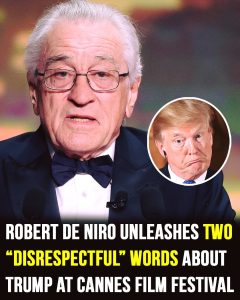At the 78th Cannes Film Festival, Robert De Niro made waves—not just for receiving the prestigious honorary Palme d’Or for lifetime achievement but also for delivering a fiery speech that openly criticized former President Donald Trump. The moment wasn’t just about honoring a cinematic legend; it became a powerful political statement that quickly went viral across social media platforms.

De Niro, widely regarded as one of the greatest actors in film history, was celebrated for his decades-long career in acting, directing, and producing. On May 13, 2025, the 87-year-old icon was presented with the honorary Palme d’Or during the opening ceremony of the Cannes Film Festival. But true to his bold and unapologetic nature, De Niro used his moment in the spotlight to take a hard stance on the current political climate in the United States, turning what could have been a traditional acceptance speech into something far more urgent and provocative.
De Niro wasn’t alone at the event. Walking the red carpet with him was his 45-year-old girlfriend, Tiffany Chen, and his daughter, Helen Grace. The three posed together for photographers and drew attention not only because of De Niro’s star power but also due to the noticeable age difference between the couple, which sparked its own conversations online. Nevertheless, the focus quickly shifted once De Niro took the stage to accept his award, presented by none other than Leonardo DiCaprio. This was a symbolic moment as well—De Niro had served as Jury President at Cannes back in 2011, and DiCaprio has often credited De Niro as a mentor and influence in his own career.
As De Niro began his speech, he immediately shifted the tone from celebratory to confrontational. “In my country,” he declared, “we are fighting like hell for the democracy we once took for granted.” His voice carried a mix of frustration and urgency, drawing immediate reactions from the audience. He explained that the decline of democratic values in America isn’t just a national issue—it’s one that should concern the global community, especially those involved in the arts. “That affects all of us here because the arts are democratic,” he emphasized.
The actor’s comments grew more specific as he took direct aim at Donald Trump. Referring to the former president as “America’s philistine president,” De Niro criticized Trump’s self-appointment as the head of the John F. Kennedy Center for the Performing Arts, one of the country’s most respected cultural institutions. To De Niro, this move was symbolic of a broader trend—what he sees as an erosion of support for the arts, education, and cultural expression under Trump’s leadership.
He didn’t stop there. De Niro highlighted a recently announced 100% tariff on foreign-made films, calling it an attack not only on global creativity but on the interconnected nature of the entertainment industry. “He has cut funding and support to the arts, humanities, and education,” De Niro warned. “And now he has announced a 100 percent tariff on films that are produced outside the US.” Pausing for a moment, he looked out at the audience and said, “Let that sink in for a minute.”
To many, the speech felt like more than just a moment of political outrage—it was a rallying cry. De Niro passionately urged those listening not to remain passive observers. “Like a film, we can’t just all sit back and watch,” he said. “We have to act, and we have to act now—without violence, but with great passion and determination.” He concluded with a strong call to action: “It’s time for anyone who cares about liberty to organize, to protest, and when there are elections, of course, to vote.”
Unsurprisingly, reactions to De Niro’s remarks were swift and divided. On platforms like YouTube and TikTok, clips of his speech quickly racked up views, sparking fierce debates. Some viewers praised him for speaking from the heart. One user commented, “Powerful, passionate, yet calm speech. The man is right. It is a call to arms to protect education and the arts—all the things Trump and his international ‘friends’ are frightened of.” Another wrote, “An actual American who cares about America and the rest of the planet that we all reside on!”
However, not everyone was impressed. Some critics labeled his comments as out of touch or unnecessary at an international event focused on cinema. On Facebook, reactions ranged from “Very well said. Powerful speech,” to harsher takes like “Shame on him,” and “This guy is insane. Out of touch completely.” While some users applauded his courage and clarity, others dismissed him as being overly dramatic or simply using the moment for personal political gain.
Supporters of De Niro countered these criticisms, insisting that artists and cultural leaders have not only the right but the responsibility to speak out. “Very well spoken by Mr. De Niro. We need to take this seriously and fight back,” one commenter said. Yet even within this camp, there were concerns about whether such statements would alienate parts of the American public or simply add more fuel to an already deeply divided political fire.
Regardless of where people stood politically, what’s undeniable is that De Niro’s speech made an impact. It reignited conversations around the intersection of politics and art, the role of celebrities in activism, and the future of free expression in an increasingly polarized world. The Cannes Film Festival, typically a celebration of global cinema, became a platform for one of Hollywood’s most iconic figures to speak his truth.
What do you think? Was Robert De Niro’s speech a bold stand for democracy and the arts, or did he go too far by politicizing a cultural event? Let us know your thoughts in the comments—because like De Niro said, staying silent is no longer an option.





